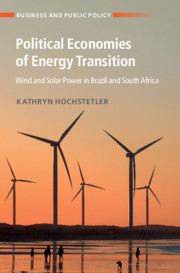Book contents
- Political Economies of Energy Transition
- Business and Public Policy
- Political Economies of Energy Transition
- Copyright page
- Contents
- Figures
- Tables
- Acknowledgments
- Abbreviations
- 1 Political Economies of Energy Transition in Brazil and South Africa
- 2 Wind and Solar Power in the Transition to a Low-Carbon Economy
- 3 States, Markets, and Energy Transition: Good Industrial Policy?
- 4 Electricity Consumption in Brazil and South Africa: Distribution and Prices
- 5 People and Place: Siting Wind and Solar Plants in Brazil and South Africa
- 6 Political Economies of Energy Transition
- References
- Index
3 - States, Markets, and Energy Transition: Good Industrial Policy?
Published online by Cambridge University Press: 12 November 2020
- Political Economies of Energy Transition
- Business and Public Policy
- Political Economies of Energy Transition
- Copyright page
- Contents
- Figures
- Tables
- Acknowledgments
- Abbreviations
- 1 Political Economies of Energy Transition in Brazil and South Africa
- 2 Wind and Solar Power in the Transition to a Low-Carbon Economy
- 3 States, Markets, and Energy Transition: Good Industrial Policy?
- 4 Electricity Consumption in Brazil and South Africa: Distribution and Prices
- 5 People and Place: Siting Wind and Solar Plants in Brazil and South Africa
- 6 Political Economies of Energy Transition
- References
- Index
Summary
Electricity decision-makers often choose to build wind and solar power for economic reasons. Renewable energy development may lead to economic growth, innovation in new sectors, and better employment options. This chapter examines which industrial policies states might choose to encourage these outcomes and whether Brazil and South Africa were successful in this. When private firms are involved – both countries chose private companies to build most of their electricity, through procurement auctions – it creates significant rents for the sector that must be managed to ensurecollective rather than narrow benefits. This chapter works within theoretical literatures on state–business relations. Brazil uses an initial local requirements stage and later public finance to encourage strong growth in wind power installation and manufacturing. The difficulty in developing a solar power industry accounts for its puzzling delay. In South Africa, similar coalitions as in Chapter 2 fight about whether the public or the private sector should produce renewable energy, pitting the powerful labor movement against the state’s industrial policies, in the absence of effective just transition policies.
Keywords
- Type
- Chapter
- Information
- Political Economies of Energy TransitionWind and Solar Power in Brazil and South Africa, pp. 79 - 131Publisher: Cambridge University PressPrint publication year: 2020



